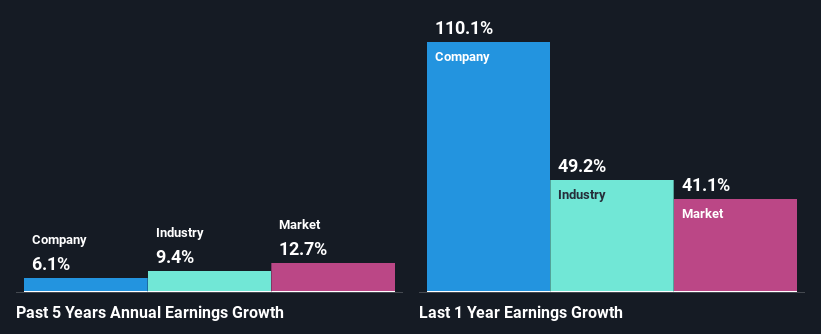Johnson Controls International plc's (NYSE:JCI) Stock On An Uptrend: Could Fundamentals Be Driving The Momentum?
Johnson Controls International (NYSE:JCI) has had a great run on the share market with its stock up by a significant 6.5% over the last month. As most would know, fundamentals are what usually guide market price movements over the long-term, so we decided to look at the company's key financial indicators today to determine if they have any role to play in the recent price movement. Specifically, we decided to study Johnson Controls International's ROE in this article.
Return on equity or ROE is a key measure used to assess how efficiently a company's management is utilizing the company's capital. Simply put, it is used to assess the profitability of a company in relation to its equity capital.
Check out our latest analysis for Johnson Controls International
How Do You Calculate Return On Equity?
The formula for ROE is:
Return on Equity = Net Profit (from continuing operations) ÷ Shareholders' Equity
So, based on the above formula, the ROE for Johnson Controls International is:
10% = US$1.9b ÷ US$19b (Based on the trailing twelve months to June 2021).
The 'return' refers to a company's earnings over the last year. That means that for every $1 worth of shareholders' equity, the company generated $0.10 in profit.
Why Is ROE Important For Earnings Growth?
We have already established that ROE serves as an efficient profit-generating gauge for a company's future earnings. We now need to evaluate how much profit the company reinvests or "retains" for future growth which then gives us an idea about the growth potential of the company. Assuming everything else remains unchanged, the higher the ROE and profit retention, the higher the growth rate of a company compared to companies that don't necessarily bear these characteristics.
A Side By Side comparison of Johnson Controls International's Earnings Growth And 10% ROE
At first glance, Johnson Controls International seems to have a decent ROE. Yet, the fact that the company's ROE is lower than the industry average of 20% does temper our expectations. Johnson Controls International was still able to see a decent net income growth of 6.1% over the past five years. So, there might be other aspects that are positively influencing earnings growth. Such as - high earnings retention or an efficient management in place. However, not to forget, the company does have a decent ROE to begin with, just that it is lower than the industry average. So this also provides some context to the earnings growth seen by the company.
Next, on comparing with the industry net income growth, we found that Johnson Controls International's reported growth was lower than the industry growth of 9.4% in the same period, which is not something we like to see.
Earnings growth is an important metric to consider when valuing a stock. What investors need to determine next is if the expected earnings growth, or the lack of it, is already built into the share price. Doing so will help them establish if the stock's future looks promising or ominous. Is Johnson Controls International fairly valued compared to other companies? These 3 valuation measures might help you decide.
Is Johnson Controls International Making Efficient Use Of Its Profits?
The high three-year median payout ratio of 82% (or a retention ratio of 18%) for Johnson Controls International suggests that the company's growth wasn't really hampered despite it returning most of its income to its shareholders.
Additionally, Johnson Controls International has paid dividends over a period of at least ten years which means that the company is pretty serious about sharing its profits with shareholders. Existing analyst estimates suggest that the company's future payout ratio is expected to drop to 33% over the next three years. The fact that the company's ROE is expected to rise to 14% over the same period is explained by the drop in the payout ratio.
Conclusion
On the whole, we do feel that Johnson Controls International has some positive attributes. Its earnings have grown respectably as we saw earlier, which was likely achieved by the company reinvesting its earnings at a decent rate of return. Still, its earnings retention is quite low, so we wonder if the company's growth could be higher, were it to pay out less dividends and retain more of its profits? Having said that, looking at the current analyst estimates, we found that the company's earnings are expected to gain momentum. To know more about the company's future earnings growth forecasts take a look at this free report on analyst forecasts for the company to find out more.
This article by Simply Wall St is general in nature. We provide commentary based on historical data and analyst forecasts only using an unbiased methodology and our articles are not intended to be financial advice. It does not constitute a recommendation to buy or sell any stock, and does not take account of your objectives, or your financial situation. We aim to bring you long-term focused analysis driven by fundamental data. Note that our analysis may not factor in the latest price-sensitive company announcements or qualitative material. Simply Wall St has no position in any stocks mentioned.
Have feedback on this article? Concerned about the content? Get in touch with us directly. Alternatively, email editorial-team (at) simplywallst.com.

 Yahoo Finance
Yahoo Finance 
